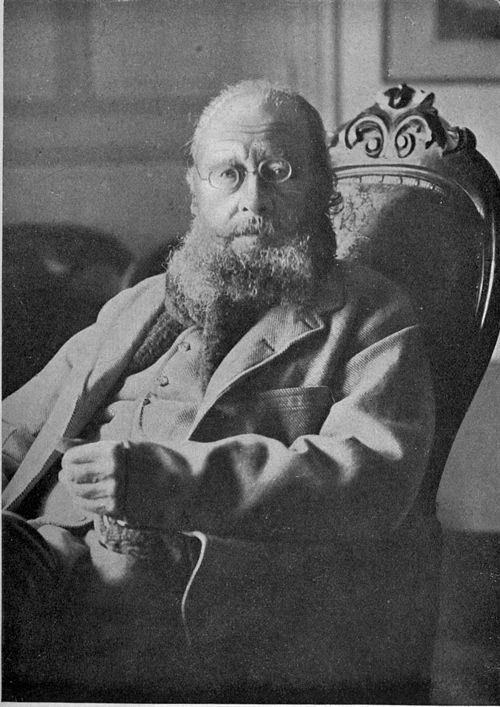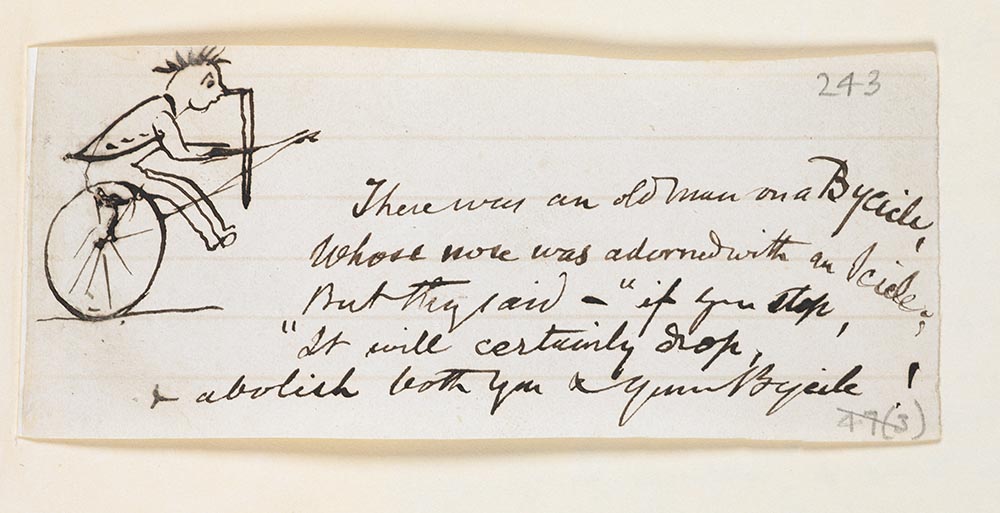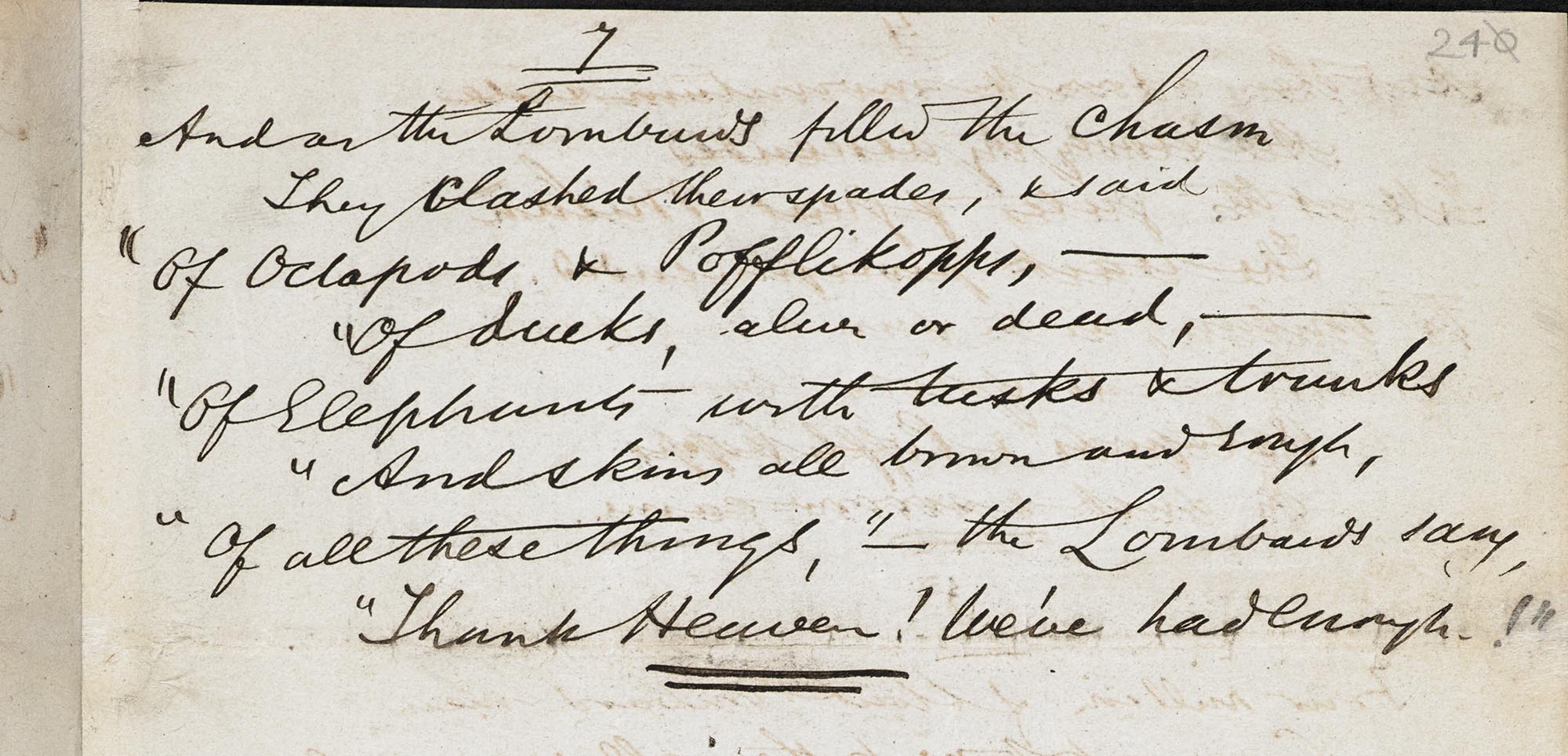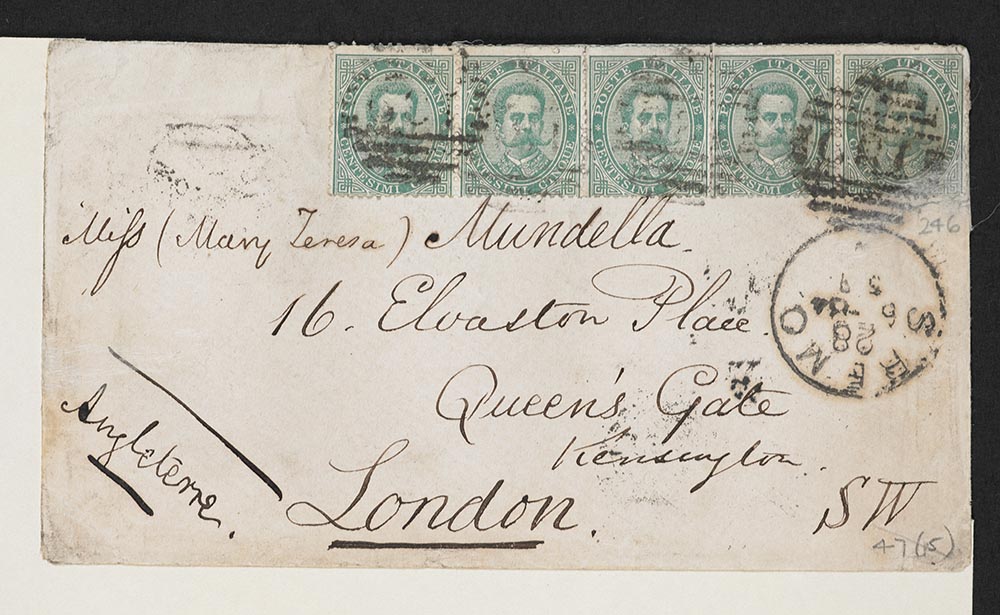Monday, 05 July 2021
A collection of previously unseen poems and letters by the famous nonsense poet Edward Lear have been discovered by a University of Nottingham PhD student, hidden in a private family collection in the British Library.
The chance discovery was made by Amy Wilcockson from the School of English while doing research for her thesis on the Scottish romantic poet, Thomas Campbell.
While sifting through a large collection of manuscripts from the Charnwood Autograph Collection, Amy noticed some hand-written pages containing a limerick, a poem and several letters signed by Edward Lear to a young English woman he befriended in Italy. After some research it became clear that these were previously unseen by the public and unpublished, until now.
 Edward Lear, 1887
Edward Lear, 1887
Edward Lear (1812-88) is Britain’s best known and loved ‘nonsense’ poet. His most famous poem, The Owl and The Pussycat, has delighted children and adults alike for 150 years. The new manuscripts were part of a stream of correspondence between Lear and Mary Mundella, daughter of the liberal politician and famous Nottinghamshire hosiery manufacturer Anthony Mundella. Mary passed this unique correspondence down to her niece, Lady Dorothea Charnwood, a keen collector of autographs. It’s this collection of papers that ended up in the British Library.
 Amy Wilcockson, School of English
Amy Wilcockson, School of English
Amy said: “I was flicking through, searching for the folio I needed when I came across a poem, 'The Last of the Octopods'. Drawn in by the odd title, I read the poem and laughed out loud, it was humorous and nonsensical. Imagine my joy when I read the signature of the poem's author - Edward Lear, the artist and poet famous for his whimsical limericks and poems, including 'The Owl and the Pussy-Cat'.
“My colleague Dr Ed Downey was working alongside me in the British Library, and I called him over to take a look at the poem. After a thorough online search, we realised we could have something special on our hands - particularly as further perusal of the collection revealed another unpublished Lear poem and an illustrated letter! I think this is a really major find for nineteenth century literary studies, and it deserves a wider public audience too.”

Image © British Library
The new Lear limerick is five lines of handwritten script with a cartoon of a comical man on a one-wheeled bicycle with a long icicle hanging from his nose. It reads:
There was an old man on a Bycicle,
Whose nose was adorned with an Icicle;
But they said – “If you stop,
“It will certainly drop,
& abolish both you & your Bycicle!
The longest of the newly discovered manuscripts is a 7-verse poem called ‘The Last of the Octopods’ written on 22nd September 1882 while Lear was staying in Italy at Monte Generoso on the border of Italy and Switzerland. It’s related to Lear’s well-known poem ‘The Octopods and Reptiles’ which is a thinly veiled attack on tourists abroad. Lear invented the name ‘Octopods’ to describe vulgar crowds of tourists – large, noisy families, hence multi-legged. The seven new verses describe the demise of the Octopods after a comical funeral procession with ducks strapped to coffins and elephant pallbearers, when they jump into a mass grave dug by the local Italians who are glad to be rid of them. The last verse reads:
And as the Lombards filled the chasm
They clashed their spades, & said
“Of Octopods & Pofflikopps, –
“Of ducks, alive or dead, –
“Of Elephants with tusks & trunks
“And skins all brown and rough,
“Of all these things,” – the Lombards sang
“Thank Heaven! We’ve had enough!”

Image © British Library
Amy’s co-researcher, Dr Edmund Downey said: “Working in Manuscripts and Archives at the British Library is always a special experience. You never know what you might find amongst the huge volumes of letters and correspondence that are stored there. It was wonderful to be with Amy when she made her discovery and we set to work straight away checking that the Lear texts were indeed new finds unknown to scholarship. The more we looked the more excited we became. These were rediscovered poems and illustrations, and important examples too, a long form poem and a new limerick and letter. I’ve felt very privileged helping bring these works to light. The texts will make a significant contribution to Lear scholarship. Amy is an incredibly astute and diligent scholar, and it’s wonderful to see her achieve much deserved recognition for her work so early in her career.”
 © British Library
© British Library
The third discovery is a handwritten letter by Lear to Mary Mundella from Villa Tennyson at San Remo in Italy on May 28th 1884. He relates his health problems, notably his swollen feet and has drawn a cartoon of himself with a huge round belly, lying on his back with his feet in the air and stars around the swollen foot to highlight his predicament. He writes:
‘I am thankful to say that though I got off on my journey of discovery on the 15th in a very sorry plight, – being very pheeble & with feet dreadfully swelled, & with the necessity of my good Mitri Cocali (Lear’s servant) pulling me in & out of Railway Carriages like a sack of Hay.’
Lear biographer Jenny Uglow says he was a great letter writer, and this new discovery is a prime example of his writing style and characterful inclusion of humorous sketches and cartoons. Taken together, the three previously unseen manuscripts are a significant addition to the public works so loved by generations of people.
The new Lear discoveries have now been digitised by the British Library1 and have been highlighted in a piece by Amy Wilcockson and Ed Downey in the Times Literary Supplement. Amy's research was funded by the Arts and Humanities Research Council Midlands4Cities (M4C) doctoral training partnership.
1 © British Library Board Add MS 70949, f. 239 (manuscript of Edward Lear poem: Octopods) Add MS 70949, f. 243 (manuscript of Edward Lear poem: lim- erick), Add MS 70949, f. 244-5 (Edward Lear letter)
Story credits
For more information, please contact Amy Wilcockson, School of English, University of Nottingham via email amy.wilcockson@nottingham.ac.uk or Emma Rayner, Media Relations Manager on 07738 291242 or emma.rayner@nottingham.ac.uk
Notes to editors:
About the University of Nottingham
Ranked 97 in the world and 17th in the UK by the QS World University Rankings, the University of Nottingham is a founding member of Russell Group of research-intensive universities. Studying at the University of Nottingham is a life-changing experience, and we pride ourselves on unlocking the potential of our students. We have a pioneering spirit, expressed in the vision of our founder Sir Jesse Boot, which has seen us lead the way in establishing campuses in China and Malaysia - part of a globally connected network of education, research and industrial engagement.
Nottingham was crowned Sports University of the Year by The Times and Sunday Times Good University Guide 2024 – the third time it has been given the honour since 2018 – and by the Daily Mail University Guide 2024.
The university is among the best universities in the UK for the strength of our research, positioned seventh for research power in the UK according to REF 2021. The birthplace of discoveries such as MRI and ibuprofen, our innovations transform lives and tackle global problems such as sustainable food supplies, ending modern slavery, developing greener transport, and reducing reliance on fossil fuels.
The university is a major employer and industry partner - locally and globally - and our graduates are the third most targeted by the UK's top employers, according to The Graduate Market in 2024 report by High Fliers Research.
We lead the Universities for Nottingham initiative, in partnership with Nottingham Trent University, a pioneering collaboration between the city’s two world-class institutions to improve levels of prosperity, opportunity, sustainability, health and wellbeing for residents in the city and region we are proud to call home.
More news…